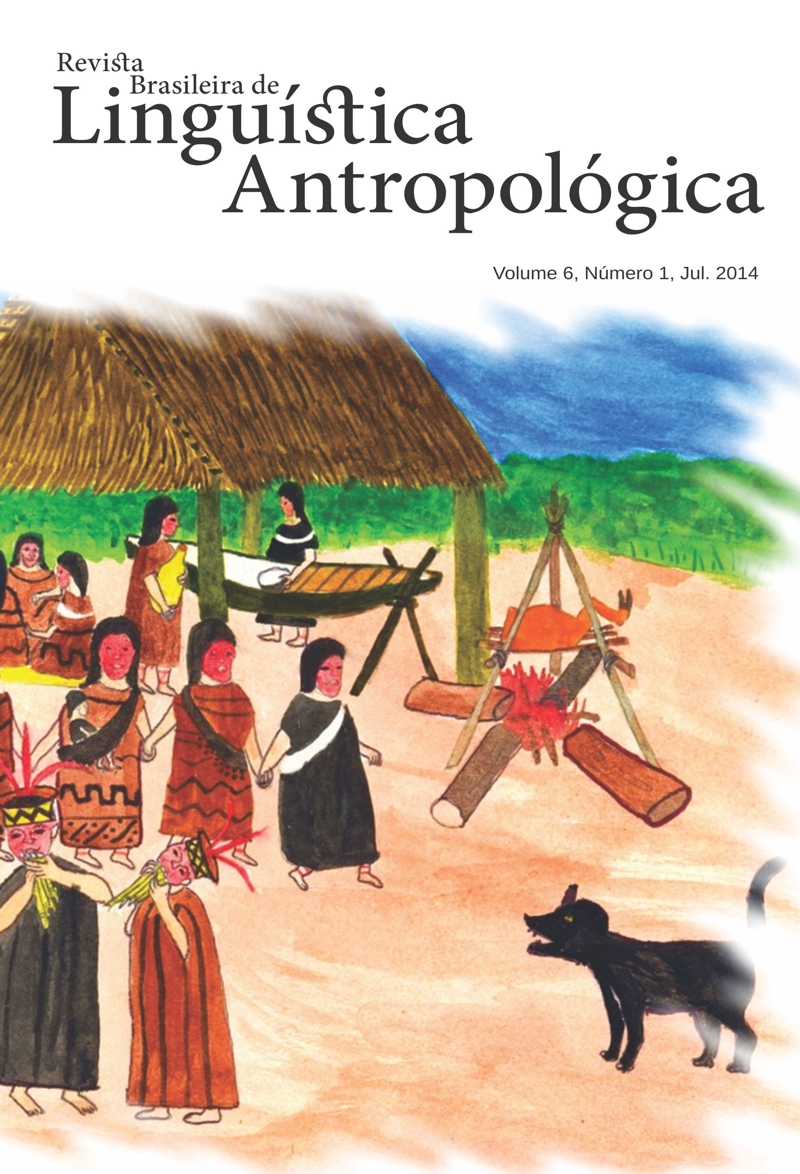Retention and innovation in the kinship lexical field: the case of Mbyá, and Guaraní paraguaio (Tupí-Guaraní)
DOI:
https://doi.org/10.26512/rbla.v6i1.21066Keywords:
Kinship terminology. Change of semantic structures. Old Guarani. Modern paraguayan Guarani. Mbyá (Tupi-Guarani).Abstract
Os resultados do volume II do Atlas Lingüístico Guaraní-Românico (cerca de 300 mapas), focalizado na terminologia do parentesco da zona bilingue Guaraní-Espanhol do Paraguai e de partes adjacentes do Brasil e da Argentina, com a inclusão de oito pontos de exploração indígena, Mbyá e Avá-Nhandeva, mostram a manutenção da maior parte do sistema tradicional do parentesco horizontal e vertical nas línguas indígenas (denominação dos irmãos e irmãs, dos avós, dos filhos, netos, dos primos, sobrinhos, tios e sogros). O elemento próprio do sistema tradicional era e é a distinção entre termos não-relacionais e termos relacionais com respeito ao sexo do falante. No Guaraní paraguaio observa-se, porém, a perda de várias distinções tradicionais, entre a referência ao homem ou à mulher, entre irmãos maiores e menores; mudanças na distinção tradicionalmente precária entre ‘pai’ e ‘tio’, ‘filho’ e ‘primo’. A terminologia hierárquica mantém-se só no centro da família nuclear moderna.References
Cerno, Leonardo. 2012. El Guaraní Correntino. Fonología, Gramática, Textos. Frankfurt ”“ Bern, etc.
Dietrich, Wolf. 2010. Lexical evidence for a redefinition of Paraguayan ‘Jopara’. STUF ”“ Language Typology and Universals 63.1: Languages in contact with Spanish, ed. by Dik Bakker and Umberto Ansaldo, Berlin: Akademie Verlag: 39-51.
Domínguez, Ramiro (1966), El valle y la loma: comunicación en comunidades rurales, cap. IV: “Constantes estructurales en sociología rural”, Asunción: EMASA, págs. 143-153. Reedições em 1995 y 2013.
Dooley, Robert A. 2006. Léxico Guarani: Dialeto Mbyá. Introdução, esboco gramatical, léxico. Cuiabá, MT: SIL.
Hoeller, Alfredo. 1932. Guarayo-Deutsches Wörterbuch. Guarayos - Hall/Tirol: Missionsprokura der P.P. Franziskaner.
Pereira, Levi Marques. 1999. Parentesco e organização social Kaiowá. Diss. de mestrado. Campinas: UNICAMP.
Montoya, Antonio Ruiz de. 1639. Tesoro de la lengua guaraní. Madrid: Iuan Sanchez. Reedição por Bartomeu Melià , Assunção: CEPAG, 2011.
Montoya, Antonio Ruiz de. 1640. Bocabulario de la lengua guaraní, Madrid: Iuan Sanchez. Reedição por Bartomeu Melià , Assunção: CEPAG, 2002.
Rodrigues, Aryon Dall’Igna e Cabral, Ana SuellyArruda Câmara. 2002, Revendo a classificação interna da família Tupí-Guaraní. Em: Cabral, Ana Suelly Arruda/ Rodrigues, Aryon Dall’Igna (organizadores), Línguas Indígenas Brasileiras: Fonologia, Gramática e História, Atas do I Encontro Internacional ..., Tomo I, Belém: EDUFPA, p. 327-337.
Service, Elman R. & Helen S. (1954), Tobati: Paraguayan Town. Chicago: University of Chicago Press.
Thun, Harald. 2005. A dialetologia pluridimensional no Rio da Prata. Em: Stahl Zilles, Ana Maria (organizadora), Estudos de variação lingüística no Brasil e no Cone Sul, Porto Alegre: Editora da UFRGS, p. 63-92.
Thun, Harald ”“ Aquino, Almidio ”“ Dietrich, Wolf ”“ Symeonidis, Haralambos (diretores). 2009. Atlas Lingüístico Guaraní-Românico (ALGR), Tomo I: Léxico del cuerpo humano, elaborado por Wolf Dietrich y Haralambos Symeonidis, Kiel: Westensee-Verlag. Tomo II: Léxico del parentesco, elaborado por Wolf Dietrich, Guido Kallfell y Harald Thun (no prelo)
Downloads
Published
Issue
Section
License

This work is licensed under a Creative Commons Attribution 4.0 International License.
Authors who publish in RBLA agree to the following terms:
a) Authors maintain the copyright and grant the journal the right of first publication, and the work is simultaneously licensed under the Creative Commons Attribution License, which allows the sharing of the work with recognition of the authorship of the work and initial publication in this journal.
b) Authors are authorized to assume additional contracts separately, for non-exclusive distribution of the version of the work published in this journal (eg, publish in an institutional repository or as a book chapter), with recognition of authorship and initial publication in this journal.
c) Authors are allowed and encouraged to publish their work online (eg, in institutional repositories or on their personal page) at any point before or during the editorial process, as this can generate productive changes, as well as increase impact and citation of the published work.







